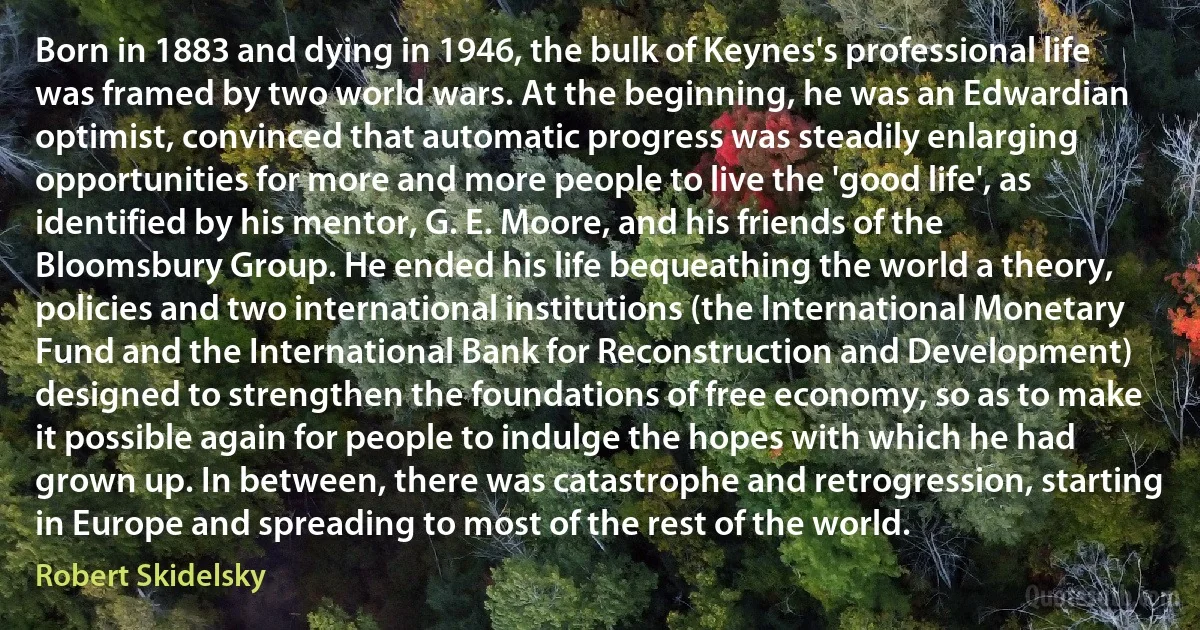
Born in 1883 and dying in 1946, the bulk of Keynes's professional life was framed by two world wars. At the beginning, he was an Edwardian optimist, convinced that automatic progress was steadily enlarging opportunities for more and more people to live the 'good life', as identified by his mentor, G. E. Moore, and his friends of the Bloomsbury Group. He ended his life bequeathing the world a theory, policies and two international institutions (the International Monetary Fund and the International Bank for Reconstruction and Development) designed to strengthen the foundations of free economy, so as to make it possible again for people to indulge the hopes with which he had grown up. In between, there was catastrophe and retrogression, starting in Europe and spreading to most of the rest of the world.
Robert SkidelskyRelated topics
automatic bank born beginning bulk catastrophe development dying enlarging free good international life live mentor people possible professional reconstruction rest retrogression world Friends Moore EdwardianRelated quotes
Mr. President, today, in his speech to the National Endowment for Democracy, President Bush gave a vivid and, I believe, compelling description of the threat to America and to freedom from radical Islamic fundamentalism. He made, in my view, a powerful case for what is at stake for every American. Simply put, the radical fundamentalists seek to kill our citizens in great numbers, to disrupt our economy, and to reshape the international order. They would take the world backwards, replacing freedom with fear and hope with hatred. If they were to acquire a nuclear weapon, the threat they would pose to America would be literally existential. The President said it well. The President is right that we cannot and will not retreat. We will defend ourselves and defeat the enemies of freedom and progress.

Joe Biden
A long decade ago economic growth was the reigning fashion of political economy. It was simultaneously the hottest subject of economic theory and research, a slogan eagerly claimed by politicians of all stripes, and a serious objective of the policies of governments. The climate of opinion has changed dramatically. Disillusioned critics indict both economic science and economic policy for blind obeisance to aggregate material "progress," and for neglect of its costly side effects. Growth, it is charged, distorts national priorities, worsens the distribution of income, and irreparably damages the environment. Paul Erlich speaks for a multitude when he says, "We must acquire a life style which has as its goal maximum freedom and happiness for the individual, not a maximum Gross National Product."

James Tobin
A final aspect of all open access orders is Schumpeter's notion of creative destruction, one of the most powerful descriptions of a competitive, open access economy. When Schumpeter wrote Capitalism, Socialism, and Democracy in the early 1940s, the economic theory of perfect competition among atomistic firms (i. e., firms too small to have market power) had come under sustained attack as unrealistic. Large and powerful economic organizations dominated the new economy, and their behavior did not match the textbooks. Despite this dominance, the economy produced historically unprecedented, sustained economic development. Schumpeter asked, How could large businesses that were supposed to choke off competition and growth nonetheless generate such spectacular productivity increases in a world that seemed ever more competitive?

Douglass North
An attempt to improve intergroup relations has to face a wide variety of tasks. It deals with problems of attitude and stereotypes in regard to other groups and to one's own group, with problems of development of attitudes and conduct during childhood and adolescence, with problems of housing, and the change of the legal structure of the community; it deals with problems of status and caste, with problems of economic discrimination, with political leadership and with leadership in many aspects of community life. It deals with the small social body of a family, a club or a friendship group, with the larger social body of a school or a school system, with neighborhoods and with social bodies of the size of a community, of the state, a nation and with international problems.

Kurt Lewin
Rarely has the incapacity of governments to hold up the course of history been more conclusively demonstrated than in the generation after 1815. To prevent a second French Revolution, or the even worse catastrophe of a general European revolution on the French model, was the supreme object of all the powers which had just spent more than twenty years in defeating the first; even of the British, who were not in sympathy with the reactionary absolutism which re-established themselves all over Europe and knew quite well that reforms neither could nor ought to be avoided, but who feared a new Franco-Jacobin expansion more than any other international contingency. And yet, never in European history and rarely anywhere else has revolutionarism been so endemic, so general, so likely to spread by spontaneous contagion as well as by deliberate propaganda.

Eric Hobsbawm
